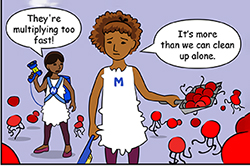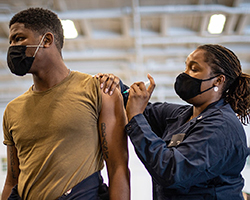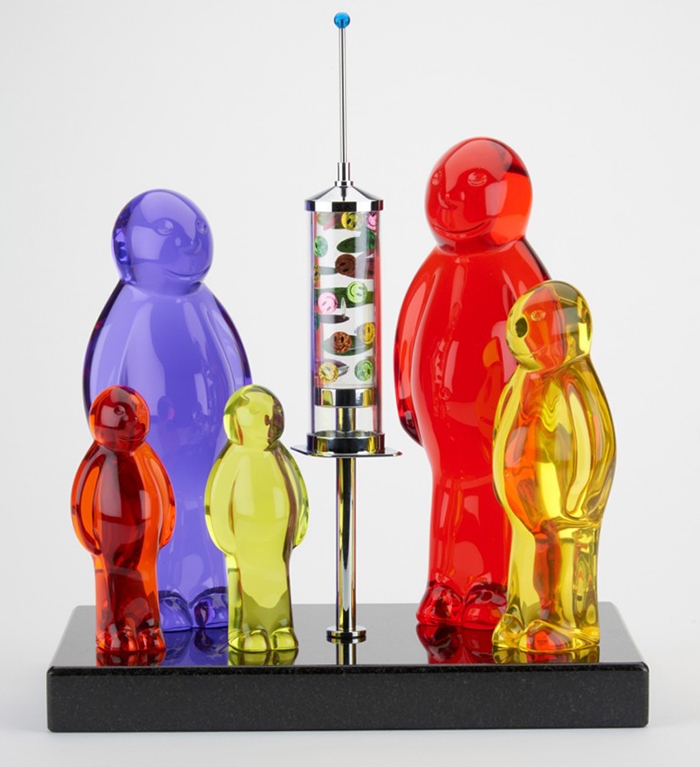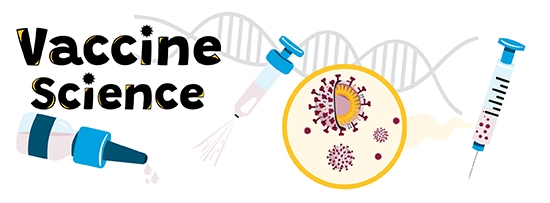show/hide words to know
Vaccines stimulate the immune system
The body is a battlefield. Germs are constantly trying to invade our bodies any way they can. Our immune systems work hard to prevent that from happening.

The immune system's job is to protect us from pathogens that would otherwise invade the body. Vaccines help train the body to fight against specific invaders. Image by Bruno/Germany via Pixabay.
Ideally, every bad germ would be destroyed by the immune system but there are some germs that are sneaky or replicate too fast. It takes time to mobilize all the cells of the immune system and this is time the germs can use to replicate. Sometimes the immune system is too late, and the germs take over before the defense can be prepared. This is why vaccines are so beneficial.
Vaccines show the immune system what a germ will look like, allowing the immune cells to mount a defense before the germ invades. Vaccines allow your immune system to remember the germ so if the germ does invade, it will be destroyed more quickly. This feature of the immune system is called "immune memory."
Vaccines program your body to fight
White blood cells, or leukocytes, are the soldiers of the immune system. They stand at the ready, waiting for any invader to enter. In this way, they are part of the body’s natural immune system. Cells of the innate immune system, like macrophages and neutrophils, try to attack and eat any germ before it can cause too much damage. If they cannot destroy all the germs, they send a message for help.

When the macrophage and neutrophil cells realize an infection is too big for them to handle, they can call in other cells for help. Visit our Viral Attack comic book for more of the story.
Certain cells, called dendritic cells, act like messengers to tell a second defense line of immune cells there is an invasion. These "adaptive" immune cells are focused attackers. They study the invaders, make a plan, and then release soldiers trained specifically for that invader. It takes time, about four to seven days, before the adaptive immune response is mobilized. During this time, the invading germs may do some damage to the body. But when these adaptive cells, known as B and T cells, do mobilize, they cause the release of antibodies and the production of killer T cells.
Antibodies are like heat seeking missiles—they find and stick to the germs. Once they stick, they act like labels to tell other cells that the germ can be destroyed. Sometimes the antibodies stick to the germs and stop them from functioning. Other times, they just label the germs but don’t stop them. The killer T cells directly kill infected cells to stop the spread of infection. While this all sounds well planned out, sometimes it takes too long for the adaptive immune system to respond. With certain diseases, that delay ends up putting people’s lives at risk.
The delay in mounting an adaptive immune response is why vaccines are so beneficial. Instead of waiting for the adaptive immune response to study the germ and then launching an attack, vaccines help train the immune system before the actual infection happens. Because the adaptive immune system is already prepared, it can respond faster and the infection can be stopped before symptoms arrive.
Vaccines save lives
The most important fact about vaccines is that they save lives. If you don’t get your vaccinations, the diseases that may infect you could put you at risk of serious harm or death. For example, polio can cause you to become paralyzed, measles can cause brain inflammation, and hepatitis can cause liver damage.

Vaccines can be especially helpful to keep your body from getting overworked, trying to fight off multiple infections at the same time. Here, a naval corpswoman gives a flu shot to a naval serviceman during the COVID-19 pandemic.
Another way that vaccines save lives is by helping your body to not get overwhelmed if many different germs attack at the same time. Every time you get sick, your body has to work hard to destroy the invaders. While it is fighting one set of germs, it is vulnerable to attacks by other germs. If too many germs attack at once, then the body’s response can get overwhelmed. By vaccinating against diseases, you are giving the body a head start on protecting itself. You are also protecting others who can’t get vaccinated. Ultimately, millions of lives are saved each year through the use of vaccines.
https://www.ncbi.nlm.nih.gov/books/NBK279396(link is external)
View Citation

Be Part of
Ask A Biologist
By volunteering, or simply sending us feedback on the site. Scientists, teachers, writers, illustrators, and translators are all important to the program. If you are interested in helping with the website we have a Volunteers page to get the process started.







